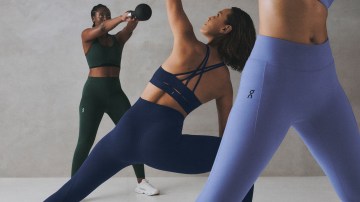E.l.f Beauty reported 9% net sales growth for its first quarter of 2026 during an earnings call on Wednesday.
This is up from last quarter’s 4% increase but a tumble compared to its full-year 2025 sales, which increased by 28% year-over-year.
“We see the potential to more than double our business over the coming years, given the significant white space we see in color cosmetics, skin care and international [retail],” E.l.f. Beauty CEO Tarang Amin said during the earnings call.
The company reached $354 million in net sales during the quarter.
E.l.f. Beauty owns E.l.f. Cosmetics and E.l.f Skin, as well as Keyes Soulcare, Well Beauty, Well People, Naturium, and Hailey Bieber’s Rhode, which the company purchased for $1 billion in May.
Amin touched on several key parts of his strategy to double E.l.f. Beauty’s business in the coming years, including international expansion.
“Six years ago, we sold $28 million internationally for about 10% of our sales,” Amin said. “Today, we sell $266 million internationally, representing 20% of our sales. We expect that mix to continue to grow as we gain share in existing markets and expand in new markets.”
Partially fueled by E.l.f. Beauty’s expansion into Sephora Mexico in October of last year, the company’s international sales grew by 30% during Q1, while U.S. sales increased by 5%.
“We’ve continued to maintain a top-three position across all of Sephora in Mexico,” Amin said. “We brought in a whole new consumer set: our younger, more diverse, engaged consumer. … [Sephora] really likes that dynamic, so we’ve been talking to them about a number of different markets.”
Further planned international expansion includes Rhode into Sephora U.K. and Canada; Naturium into Sephora Australia; E.l.f. Cosmetics into six Sephora doors in the Middle East; and entry into one of Europe’s largest drugstores, Rossmann, beginning in Poland for E.l.f. Beauty.
Amin also addressed the $1 price increase E.l.f Beauty rolled out across all products on August 1. It marks only the third price increase for the brand since its launch in 2004, he said during Wednesday’s call.
“Overall, retailer acceptance has been good for our price increase,” Amin said. “We are hearing of a number of brands that are going to be taking pricing [increases]. In this environment right now, and with the uncertainty of tariffs and the tariff impact, you will probably see more and more companies take pricing [increases]. We tend to lead, and then we will see how many more follow.”




